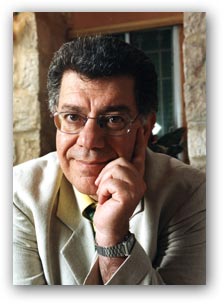 Sason Shaik is in the Institute of Chemistry at the Hebrew University of Jerusalem and works on bonding, chemical catalysis, and structure and reactivity of metalloenzymes. Sason was originally interviewed on Reactions in May 2011; given his recent paper in Nature Chemistry titled “Oriented electric fields as future smart reagents in chemistry,” we thought we would check in and see what’s changed recently.
Sason Shaik is in the Institute of Chemistry at the Hebrew University of Jerusalem and works on bonding, chemical catalysis, and structure and reactivity of metalloenzymes. Sason was originally interviewed on Reactions in May 2011; given his recent paper in Nature Chemistry titled “Oriented electric fields as future smart reagents in chemistry,” we thought we would check in and see what’s changed recently.
1. What has changed in your research since you last appeared on Reactions?
Firstly, our research on bonding has intensified since we predicted the quadruple bond in C2. We are now working on other molecules with these bonding features. Our work on charge shift bonding published in Nature Chemistry1, is branching too, because there might be the first experimental verification of this bonding type. This caused us to branch to metallomics, where this bond may be prevalent. Secondly, our enzyme work has been enriched and upgraded once we took molecular dynamics (MD) seriously. Now we are able to predict enantioselectivity and regioselectivity using MD and QM/MM calculations. And finally, our work on electric fields effects in reactivity has been boosted by the experimental support provided by the Spanish-Australian teams this year. So we are going very strong in a few fronts!
2. What do you think is the most important aspect of your recent Nature Chemistry paper?
I feel that this paper makes predictions and tries to teach the reader how to think about the effects of oriented electric fields on chemical reactivity, and how to design appropriate experiments. If this activity catches on, this will affect the science of chemistry in a serious manner.
3. Which is your favourite element — or if not an element, favourite molecule and why?
My favourite element is iron — it is so reactive in many interesting manners due to its many close lying spin-states. My favourite molecule is benzene. It’s so simple looking, and yet it has been serving as a springboard of many influential concepts in chemistry.
4. Imagine that your inbox is empty, there is nothing in need of writing, and there are no experiments that need attention: how would you spend this free time?
I would write poetry and maybe some history…
5. If you were given $1 million as you stepped out of your office to do with what you will, what would you use it for?
The first thing would be to take a trip around the world. Then back to paper writing.
6. Where would you most like to travel to, but have never been — and why?
Antarctica.
7. Which chemist do you look up to most, living or otherwise — and why?
My mentor Roald Hoffmann. I learned from Roald how to handle myself in science. I admire his grand knowledge and thoughtful wisdom.





Please sign in or register for FREE
If you are a registered user on Research Communities by Springer Nature, please sign in